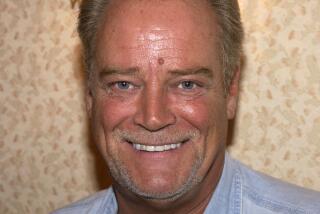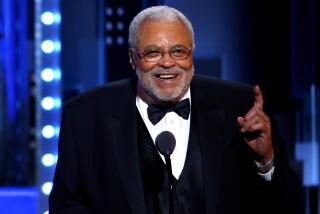Norman Rose, 87; Actor Gave Voice to Juan Valdez and to God
- Share via
Norman Rose, an eclectic actor whose face was less recognizable than his room-filling baritone, which prompted colleagues to dub him “the Voice of God,” has died. He was 87.
Rose died Friday at his home in Upper Nyack, N.Y., after a brief illness, according to his agent, John J.A. Hossenlopp III.
The actor, who actually was the voice of God in Woody Allen’s 1975 motion picture, “Love and Death,” began performing as a student at George Washington University in Washington, D.C., and worked steadily on stage, screen, television and radio for the next 65 years.
He performed on Broadway in “Richard III” and “St. Joan,” and off-Broadway in “The Brothers Karamazov.” In movies, he was Allen’s lawyer in “The Front” and Sean Connery’s robbery victim in “The Anderson Tapes.” On television he played the psychiatrist Dr. Marcus Polk in the soap operas “One Life to Live” and “All My Children.”
But despite his capabilities in visible roles, Rose proved most in demand for his stentorian voice. He was hired to speak for fictional serape-clad Juan Valdez, promising “only the ripest beans” over a decade of Colombian coffee commercials. Most media credits listed his role as simply “the narrator.”
On radio, Rose narrated “The Greatest Story Ever Told” and NBC dramas such as Ray Bradbury’s “The Martian Chronicles.” His voice led listeners through Studio One’s early television saga “The Night America Trembled,” and years later introduced such specials as Tolstoy’s “War and Peace” and Mikhail Baryshnikov’s annual production of “The Nutcracker.”
Rose was the opening narrator of the film “Message From Space: Galactic Wars” and played a newsreel announcer in the motion picture version of “Biloxi Blues.”
The actor also dubbed foreign movies into English, recorded books for the blind and did voice-overs for countless commercials and sports and commercial videos.
A published poet, in 1992 he teamed with one of his employers, Primo Donna Productions in Fairfield, N.J., to produce the innovative Off the Page, a videocassette poetry magazine.
He invited poets to read their own work for the magazine, and asked actors to read, admitting that he was torn between the two choices.
“I’m inclined to favor the professional performer, because I am one,” the actor-poet told The Times in 1992. “The poet simply doesn’t have the techniques an actor does.... On the other hand, who could read ‘The Waste Land’ better than T.S. Eliot?”
Rose is survived by his wife of 60 years, painter Catherine Vagnoni Rose; four children, Margaret Wood and Jack, Elizabeth and Johanna Maria Rose; a sister, Arlene Gordon; five grandchildren; and two great-grandchildren.
More to Read
The biggest entertainment stories
Get our big stories about Hollywood, film, television, music, arts, culture and more right in your inbox as soon as they publish.
You may occasionally receive promotional content from the Los Angeles Times.










